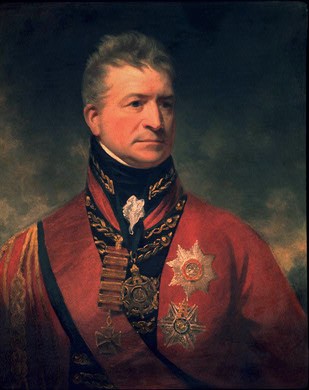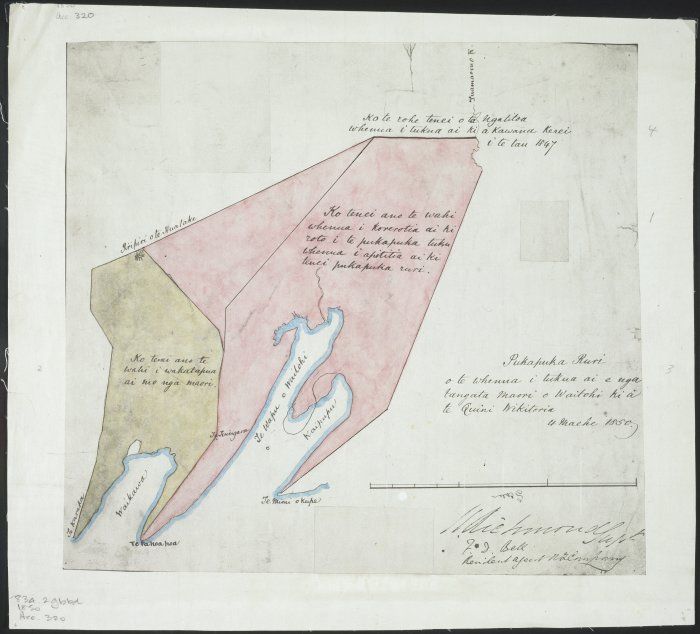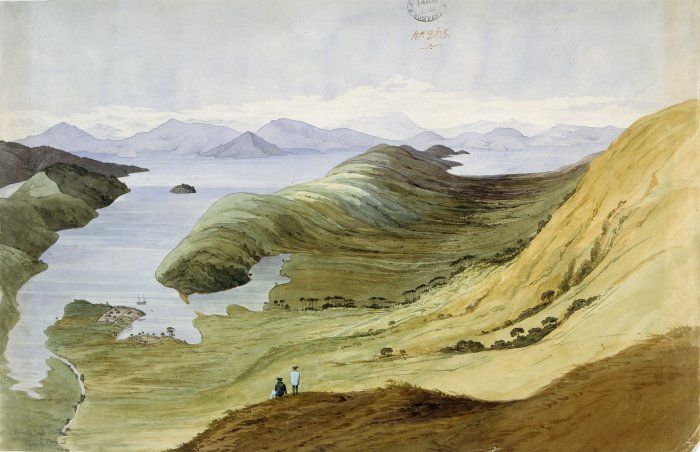Sir Thomas Picton (1758-1815) and the naming of Picton
Picton was named after the British general and Waterloo hero, Sir Thomas Picton, although he never visited New Zealand
Picton was originally called Waitohi, or Waitohi Pā. It was named by the local Māori, the Te Ātiawa, who occupied the site. The name Waitohi means wai, or water, and tohi - the tohi ritual, in which the tohunga dipped karamu branches in the sacred stream and brushed the right shoulder of warriors before battle. This rite was last performed on soldiers preparing to leave with the 28th Maori Battalion in World War II. Another, discredited explanation, recalls Te Weranga o Waitohi, Te Rauparaha's sister who is reputed to have died in a scrub fire.*
Waitohi was purchased from the Māori in 1850 by Sir George Grey and Sir Francis Dillon, the New Zealand Company agent. The name of the town was later changed to Picton, after Sir Thomas Picton, a British Army general and hero of the Battle of Waterloo - now also known to be a brutal slave-owner. Sir Thomas never came to Picton, nor had any links with it, but this way of naming places was typical of colonial times.
At the time Marlborough separated from Nelson and became a province in 1859, central Government decided to name the two main Marlborough towns Picton and Blenheim. Picton became the capital of Marlborough until 1865.
Thomas Picton was born in 1758 in Wales and became a life-long soldier. He fought in the American War of Independence, in the West Indies and, in 1801, became the Governor of Trinidad. He was thanked seven times by the English Parliament for bravery in the Peninsular War in Spain, and knighted for his services in the army. He conducted the siege of Badajoz in Spain, where many lives were lost. The Duke of Wellington, after whom Wellington is named, and who later was responsible for defeating Napoleon Bonaparte in the battle of Waterloo, wanted Sir Thomas Picton to join his forces. He considered him to be ‘a rough-mouthed devil' but had confidence in his ability as a soldier and leader, and in 1815 gave him a high command in his army after Napoleon returned from Elba.
Seriously hurt two days before in an earlier battle, Sir Thomas kept his wounds secret because he wanted to fight at Waterloo against Napoleon. Sir Thomas Picton's uniform did not arrive in time for the battle so it is said that he fought in civilian clothes and a top hat. He was killed by a shot through the temple from a musket ball while leading his brigade to the charge. It is reported that the Duke of Wellington was moved to tears by the carnage on the battlefield and the number of men who had been killed.
The defeat of Napoleon at the battle of Waterloo in 1815 and his exile to St Helena allowed the British nation to gain supremacy for around the following 100 years, and ensured a relatively peaceful Europe. Britain established an Empire, including countries like India, Australia, Canada and New Zealand, all of which are now independent. Many New Zealanders are descended from English migrants and for years still thought of England as ‘Home' and talked about the ‘Old Country', especially during the South African (‘Boer') War and World Wars I and II.
Picton is not the only town named after Sir Thomas Picton, there is also a Picton in New South Wales, Australia, and one in Canada.
*The name Waitohi
As indicated in the introduction, the name Waitohi means wai - water, and tohi - the tohi ritual, in which the tohunga dipped karamu branches in the sacred stream and brushed the right shoulder of warriors before battle. This meaning has been thoroughly checked with Māori kaumatua who still understood the old language, and is agreed by the present Te Ātiawa leaders.
Te Rauparaha's sister did not die until 1839, on Mana Island where her tangi was held, and she never came to Waitohi. The place-name was in use before her death. It was never the practice to name places in memorial to people still living. This misinformation has been published in several books and probably began as guesswork.
On the Waitohi Purchase Documents it mentions Te Weranga o Waitohi which refers to the energy of the sacred waters. This has been misquoted as ‘Te Wera o Waitohi'.
2009
Updated: April 2020
Story by: Julie Kennedy, supported by Picton Museum
Sources
- Buick T. L. (1976) Old Marlborough Christchurch, N.Z.: Capper Press (reprint) p. 457
- Esdaile, C. (2008) Napoleon's Wars. London: Penguin Books pp. 557-562 [Note: plate 27 (opposite p 383) of battlefield of Waterloo]
- Kelly, H.D. (1976) As High as the Hills, Whatamango Bay: Cape Catley, pp.16-17
- McIntosh A.D. (Ed.) (1977). Marlborough a Provincial History, Christchurch, N.Z.: Capper Press (reprint), pp. 176-192
- Reed, A.W. (1996). The Reed Dictionary of Maori Place names. 3rd ed. Auckland: Reed. pp.132-133
- Reed, A W. (2002). The Reed dictionary of New Zealand place names. Auckland: Reed. p.562
Further Sources
Books
- Buick T. L. (1976) Old Marlborough Christchurch, N.Z.: Capper Press (reprint) p. 457
http://www.worldcat.org/oclc/156205323&referer=brief_results - Discover New Zealand; a Wise's guide.(1994). 9th ed. Auckland, N.Z.: Wises Publications. p. 333
http://www.worldcat.org/oclc/84743618&referer=brief_results - Esdaile, C. (2008) Napoleon's Wars. London: Penguin Books pp. 557-562
http://www.worldcat.org/oclc/154763562&referer=brief_results - Havard, Robert. (1996). Wellington's Welsh general: a life of Sir Thomas Picton. London: Aurum Press.
http://www.worldcat.org/oclc/35985833&referer=brief_results - Kelly, H.D. (1976) As High as the Hills, Whatamango Bay: Cape Catley, pp.16-17
http://www.worldcat.org/oclc/3241095&referer=brief_results - MacDonald, C A. (2003). Pages from the past. Christchurch, N.Z.: Cadsonbury. [reprint of original ed. 1933]
http://www.worldcat.org/oclc/155888582?referer=di&ht=edition - McIntosh A.D. (Ed.) (1977). Marlborough a Provincial History, Christchurch, N.Z.: Capper Press (reprint), pp. 176-192
http://www.worldcat.org/oclc/229463724&referer=brief_results - Mitchell, H A & M J (2004; 2007) Te Tau Ihu o Te Waka: A History of Maori of Nelson and Marlborough. Wellington, N.Z. : Huia Publishers in assoc. with the Wakatū Incorporation. Vol I pp. 358-365, 372; Vol II pp. 32-33.
http://www.worldcat.org/oclc/63170610?referer=br&ht=edition [Vol I] http://www.worldcat.org/oclc/276659471?referer=br&ht=edition [Vol II] - Reed, A.W. (1996). The Reed Dictionary of Maori Place names. 3rd ed. Auckland: Reed. pp.132-133
http://www.worldcat.org/oclc/37527526&referer=brief_results - Reed, A W. (2002). The Reed dictionary of New Zealand place names. Auckland: Reed. p.562
http://www.worldcat.org/oclc/49290681&referer=brief_results
Newspapers
- Andrews, J. (1985). The Picton railway. Journal of the Nelson and Marlborough Historical Societies, 1, (5): p.38
http://www.nzetc.org/tm/scholarly/tei-NHSJ04_05-t1-body1-d8.html - Chambers, Betty. (2007, Jun/Jul). Picton. New Zealand Memories, 66, 20-21
- Kerr, Lloyd. (2000, Aug/Sep). Picton - port of entry to the South Island: a photographic essay. New Zealand Memories, 25, p.62-63.
- Of boats and things. (1997). Marlborough's past and present, 6: p.14.
- Pryce, M.H. (1977) Picton - a short history. New Zealand Marine News, 27(4): p.142-145.
- Robin, Fay. (1998, May). A Picton past. North and South, 146, p.30-31.
Websites
- [Acquisition of Waitohi] (1849, May 26) Nelson Examiner and New Zealand Chronicle, p.50
http://paperspast.natlib.govt.nz/cgi-bin/paperspast?a=d&d=NENZC18490526.2.4 - Mackay, A (1850) [Deed of sale of Waitohi] Compendium of Official Documents Relative to Native Affairs in the South Island, Volume One. Retrieved from New Zealand Electronic Text Centre
http://www.nzetc.org/tm/scholarly/tei-Mac01Comp-t1-g1-t6-g1-t17-g1-t9-g1-t1.html - [Road through Waitohi Pass] (1849, December 1)Nelson Examiner and New Zealand Chronicle, p. 154
http://paperspast.natlib.govt.nz/cgi-bin/paperspast?a=d&d=NENZC18491201.2.7 - [Survey of Waitohi] (1849, November 17) Nelson Examiner and New Zealand Chronicle, p.146
http://paperspast.natlib.govt.nz/cgi-bin/paperspast?a=d&d=NENZC18491117.2.7 - Thomas Picton, 1758. Retrieved from Wikipedia, 26 July 2009:
http://en.wikipedia.org/wiki/Thomas_Picton - [Waitohi as port for the Wairau] (1848, October 21) Nelson Examiner and New Zealand Chronicle, p. 134
http://paperspast.natlib.govt.nz/cgi-bin/paperspast?a=d&d=NENZC18481021.2.6
Maps
- Archive: Picton Historical Society, History Notes, and images: portrait of Sir Thomas Picton, and image of Picton Castle in Wales, home of Sir Thomas Picton [held Picton Museum]


